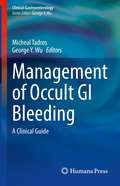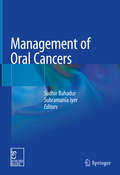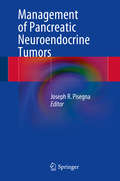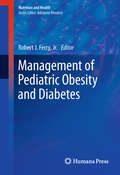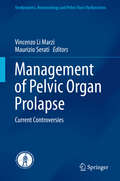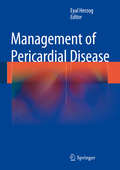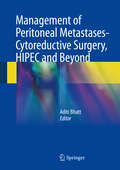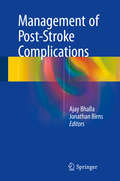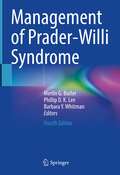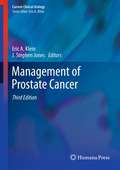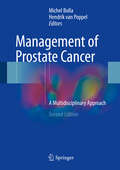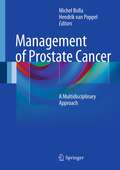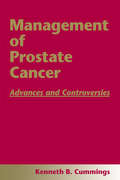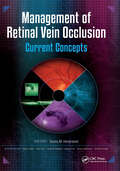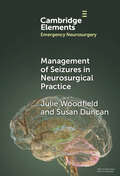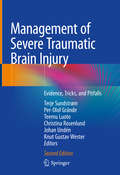- Table View
- List View
Management of Occult GI Bleeding: A Clinical Guide (Clinical Gastroenterology)
by George Y. Wu Micheal TadrosThis book provides a concise, state-of-the-art overview of occult GI bleeding. The text reviews the epidemiology, screening and detection methods for localization, and prominent treatment strategies for occult GI bleeding. It also features a dedicated section on special patient populations including children, premenopausal women, older adults, and patients with other predisposing, and complicating medical conditions. This volume is supplemented with numerous color illustrations, photographs, and table, and is one of the few dedicated resources on occult GI bleeding. Written by experts in the field, Management of Occult GI Bleeding: A Clinical Guide is a valuable resource for clinicians, practitioners, and students who are involved in the treatment of patients with occult GI bleeding.
Management of Open Globe Injuries
by Seanna Grob Carolyn KloekThis book uses a unique case-based approach to review the intra-operative and peri-operative management of patients with severe ocular trauma and open globe injuries. The case- based structure of this text allows readers to easily reference the type of injury they are treating in order to assist with management of their patients and to recognize indications to involve other ophthalmic and surgical specialties in the management of patients with open globe injuries. Management of Open Globe Injuries will be an indispensable resource for ophthalmologists who are called upon to care for patients who have suffered open globe trauma.
Management of Oral Cancers
by Subramania Iyer Sudhir BahadurTumor biology varies at different subsites in the oral cavity, and therefore carcinoma of the gingivo-buccal sulcus (also known as Indian cancer) behaves differently from carcinoma of the tongue. Oral cancer is very often diagnosed at an advanced stage with neck metastasis, and most cases have a guarded prognosis. Loco-regional recurrences are frequent and morbidity following treatment is considerable. However, results have improved in recent years, particularly in early and certain advanced stages, due to better imaging and case selection, improved surgical techniques, including those for reconstructive surgery, a multidisciplinary team approach and a better understanding of tumor biology and prognostic factors.This book comprehensively and systematically reviews all these aspects of diagnostic and therapeutic advances in oral cancer, particularly discussing early detection, epidemiology, chemoprevention and current research. Written by specialists who are active leaders in basic sciences or clinical fields, the chapters address individual and collective issues in managing patients with oral cancer, and provide insights into various treatment approaches. The authors share their knowledge and experience and provide extensive literature sources to encourage clinicians to be flexible, innovative and help them make the best, educated decisions for individual patients.
Management of Orbito-zygomaticomaxillary Fractures
by Hisham Marwan Yoh Sawatari Michael PelegThis excellently illustrated book provides a thorough overview of the management of orbito-zygomaticomaxillary fractures, which can be complex since both function and facial form may be affected. Practical guidance is offered on all aspects, including clinical examination, CT assessment, surgical planning, surgical access and techniques, soft tissue management, intra- and postoperative assessment, and management of complications. In addition, important technological advancements in planning and treatment are described, including the use of navigation systems and 3D printing. Finally, the authors discuss strategies involving delayed surgical intervention and revision surgery for the malpositioned zygomatic maxillary complex. Management of Orbito-zygomaticomaxillary Fractures will be of value for oral and maxillofacial/craniomaxillofacial surgeons at all levels of experience
Management of Pancreatic Cancer and Cholangiocarcinoma
by Hiroyuki Isayama Yousuke Nakai Takashi SasakiThis comprehensive book presents the latest evidence-based data on pancreatobiliary malignancies, including the epidemiology, examination, treatment and endoscopic management. It explores a range of topics, such as risk factors, detection strategies, and novel treatment approaches like precision medicine and immunotherapy.Although there have been rapid improvements in the management of these diseases, the survival period has not yet reached a satisfactory level. This book will help those doctors needing to share the latest information with the patients and their families. It provides a wealth of practical information to help surgeons, endoscopists and oncologists as well as physicians, basic researchers and professionals at medical device and pharmaceutical companies broaden their understanding of the current treatment and management strategies for pancreatobiliary malignancies.
Management of Pancreatic Neuroendocrine Tumors
by Joseph R. PisegnaThis book provides the reader with a multidisciplinary approach that is state of the art and reflects input from the European Neuroendocrine Tumor Society and the North American Neuroendocrine Tumor Society. In particular, the text focuses on the pathophysiology of neuroendocrine tumors and includes a comprehensive review of the most recent developments in understanding the complex hormone and receptor signaling that is important for the future development of potent pharmacological treatments. The volume reviews the pathological grading and staging systems providing useful clinical information for the treating clinician as well as a useful reference for pathologists. The clinical management of neuroendocrine tumors is reviewed enabling the treating physician to understand the diagnostic approaches to differentiating the various types of neuroendocrine tumors. In addition, the treatments are reviewed in great detail and include novel radiological, surgical, and chemotherapeutic approaches. The reader will utilize this book as both a comprehensive and quick reference guide through the use of diagnostic and treatment algorithms. Written by international experts in their particular field of study, Management of Pancreatic Neuroendocrine Tumors will be of great value to medical oncologists, endocrinologists, gastroenterologists, pathologists, surgeons, and diagnostic and interventional radiologists.
Management of Patients with Dementia: The Role of the Physician
by Gunhild Waldemar Kristian Steen FrederiksenThis book provides an overall introduction to the medical management of dementia with chapters dedicated to specific topics such as pain, epilepsy, vascular risk factors in dementia and review of medication, which are often not addressed in books on the subject, and thereby filling a gap in the field. Chapters are supplemented with cases to highlight key concepts and treatment approaches, and to provide the reader with the possibility to reflect on management options and the readers´ own current practice.This book is aimed at clinicians of different specialties (mainly neurology, psychiatry, geriatric medicine and general practice/family medicine) who manage patients with dementia on a regular basis, and thus provides useful guidance to be used in the clinic.
Management of Patients with Pseudo-Endocrine Disorders: A Case-Based Pocket Guide
by Michael T. McDermottComprised of illustrative clinical cases, this unique pocket guide presents descriptions of patients who have symptoms, physical signs or laboratory abnormalities that they believe are due to disorders of the endocrine system (hormone secreting glands and overall metabolism) but which are not, or probably are not, due to an endocrine disorder. These are common situations in the clinical practice of endocrinology. Each chapter includes clinical cases illustrating differing presentations and outcomes, and each individual case description is followed by a discussion that includes the differential diagnosis of these symptoms, signs and/or lab abnormalities and why they are not likely due to endocrine disease or, alternatively, why and how a deeper exploration for endocrine disorders might be needed. In all cases, an emphasis is placed on listening to the patient and providing a respectful and compassionate response and approach to evaluation and management of the proposed disorder. Discussions are referenced whenever reference material is available, and evidence-based clinical practice guidelines are presented whenever applicable. Topics discussed include chronic and adrenal fatigue, obesity, anxiety and depression, sweating and flushing, alcohol- and opioid-induced symptoms, low testosterone, pseudo-hypoglycemia and pseudo-Cushing's syndrome, among others.Clinical endocrinologists, primary care physicians and related allied medical professionals will find Management of Patients with Pseudo-Endocrine Disorders a valuable resource in their clinical practice with these common but often challenging patients.
Management of Pediatric Obesity and Diabetes
by Robert J. Ferry Jr.The twin epidemics of obesity and type 2 diabetes mellitus (T2DM) continue to affect an ever increasing number of children, adolescents, and young adults. Management of Pediatric Obesity and Diabetes provides healthcare trainees and professionals with practical, comprehensive, and contemporary approaches to the pediatric patient at risk for obesity, T2DM, and related conditions. A unique guide on the subject, this volume provides clinical paradigms for diagnosis and management of pediatric T2DM and related conditions, while succinctly describing state-of-the-art basic and clinical sciences underlying these problems. The chapters in this volume are independent and concise. Each chapter focuses on a key clinical issue or mechanism of disease. Providing practical, data-driven resources based upon the totality of the evidence, this important text helps the reader understand the basics of pediatric obesity and T2DM and implement strategies to prevent and treat obesity and diabetes in children and adolescents. Management of Pediatric Obesity and Diabetes provides health professionals across many areas of research and practice with up-to-date, well-referenced, and comprehensive evidence on identification, treatment, and prevention of these chronic, serious, metabolic diseases in children. This volume will serve the reader as the most authoritative resource in the field to date.
Management of Pelvic Organ Prolapse: Current Controversies (Urodynamics, Neurourology And Pelvic Floor Dysfunctions Ser.)
by Vincenzo Li Marzi Maurizio SeratiThis book provides a comprehensive and up-to-date overview of the surgical treatment of pelvic organ prolapse, focusing especially on issues that continue to arouse controversy. In the first section, leading experts present detailed information on the surgical anatomy, pathophysiology, and epidemiology of prolapse and also the impact of concomitant functional disorders. The second section focuses on diagnostic work-up and the third is dedicated to the various treatment options aimed at resolution of the condition. The closing chapters discuss outcome measures and analyze the effects of prolapse surgery on urinary, bowel, and sexual symptoms. In 1966 Richard TeLinde stated that, “Every honest surgeon of extensive and long experience will have to admit that he is not entirely and absolutely satisfied with his long-term results of all his operations for prolapse and allied conditions.” Although many uncertainties in the field have since been resolved, some major issues still require clarification. Often it can be difficult to find the right balance between treatment effectiveness in the long term and risk reduction, including with respect to complications. This book will help trainees and less experienced surgeons to make appropriate treatment choices and achieve optimal outcomes.
Management of Penile Cancer
by Daniel J. CulkinManagement of Penile Cancer provides a comprehensive and state-of-the-art overview of the major issues specific to the field of penile cancer. The sections of the book are structured to review the overall scope of issues of penile cancer, including diagnosis and staging, surgical approaches and the treatment of advanced disease. As multidisciplinary care is an integral part of the treatment of penile cancer, this book is unique in the inclusion of collaborating authors from a variety of integrated disciplines, including urology, radiation oncology, medical oncology and reconstructive surgery. Written by recognized experts in their field, Management of Penile Cancer is a unique and valuable resource in the field of penile cancer, both for those currently in training and for those already in clinical or research practice.
Management of Pericardial Disease
by Eyal HerzogPericardial disease is a broad term that describes a wide range of pathologies. The clinical aspects of pericardial disease encompass acute pericarditis, pericardial tamponade, pericardial effusion, constrictive pericarditis, and effusive-constrictive pericarditis Those disorders differ not only in clinical presentation but also in the timeline of disease development; for example, pericardial tamponade is commonly an acute, life-threatening event, whereas constrictive pericarditis is a chronic process developing over months to years. Therefore, pericardial disease management is challenging for most clinicians. The evidence base in the field is relatively scarce compared with other disease entities in cardiology. European Society of Cardiology released guidelines for the diagnosis and management of pericardial diseases Currently there are no guidelines from American cardiology societies to help clinicians in dealing with pericardial disease. In this book, my goal is to provide extensive review of pericardial disease evaluation and management A unified, stepwise pathway-based approach for the management of pericardial disease is provided at the end of the book.
Management of Peritoneal Metastases- Cytoreductive Surgery, HIPEC and Beyond
by Aditi BhattThe widespread acceptance among the oncology community at large of cytoreductive surgery and HIPEC as a potentially curative treatment for peritoneal metastases has paved the way for innovative new therapies that could benefit a larger proportion of patients. Much has been and continues to be published on this subject.This book provides comprehensive reviews on the various aspects of managing peritoneal metastases. The authors highlight essential practical issues that surgical oncologists encounter in their day-to-day practice, and try to before provide evidence based answers to address them. All chapters were written and/or reviewed by leading experts in this field.
Management of Post-Mortem Pregnancy: Legal and Philosophical Aspects
by Daniel SperlingRecent advances in medical technology have provided healthcare staff with the possibility of maintaining the life of a brain-dead pregnant woman on life-support in order to achieve successful delivery of the foetus. Management of Post-Mortem Pregnancy examines the legal and ethical difficulties surrounding such post-mortem management. Offering practical guidance based on a combined analysis of similar situations that affect pregnant women's lifestyle and physical condition and of the legal framework of pregnancy clauses in advance directive legislation, the volume considers pregnant women's obligations towards their foetuses. It discusses the main moral, legal, psychological, religious, spiritual and physical aspects of the question on the interests of dead people, as well as the jurisprudential question of the foetus' interests. The book will be a valuable guide for all those involved with the decision-making process of such tragic cases. It will also be of wider use to anyone with an interest in legal, ethical and bio-medical issues.
Management of Post-Stroke Complications
by Ajay Bhalla Jonathan BirnsThis book highlights the underlying importance of post-stroke complications during recovery, allowing healthcare professionals managing stroke patients to understand their frequency and identify which patients are at risk of developing such complications. Complications are categorised into neurological and non-neurological, and the time-frame for these complications both in the short-term and long-term are discussed. The common practices in managing post-stroke complications and the skills required in their prevention are described, as is the evidence base from clinical trials around their management. The book concludes with a discussion of new developments and research priorities for the future. Management of Post-Stroke Complications is aimed at members of the multidisciplinary stroke team, stroke physicians, neurologists, general practitioners, stroke specialists in training, and medical students.
Management of Prader-Willi Syndrome
by Phillip D. K. Lee Barbara Y. Whitman Merlin G. ButlerNow in a fully revised and updated fourth edition, this book remains the most comprehensive resource on Prader-Willi syndrome (PWS) available on the market. There have been significant changes in the diagnosis, clinical care and treatment of PWS since the previous edition was published in 2006, and more thorough information on understanding the cause and diagnosis of the condition, along with clinical presentation and findings with natural history data now available. The book is divided into three thematic sections. Part One discusses the genetics, diagnosis, research and overview of PWS, including current laboratory testing. The medical physiology and treatment of PWS comprise Part Two, covering the GI system, obesity as well as the use of growth hormone. Part Three, the largest section, presents a wide-ranging, multidisciplinary management approach to PWS, attending to the many manifestations of the condition. Topics here include neurodevelopmental aspects, speech and language disorders, motor issues, psychological and behavioral management, educational and transitional considerations, vocational training and residential care, and advocacy for both school discipline and sexuality. Syndrome-specific growth charts, benefits eligibility information and additional resources are included in helpful appendices. Timely and well-crafted, this latest edition of Management of Prader-Willi Syndrome remains the gold standard for clinicians and health care providers working with patients diagnosed with this rare obesity-related genetic disorder.
Management of Pregnant and Neonatal Dogs, Cats, and Exotic Pets
by Cheryl LopateManagement of Pregnant and Neonatal Dogs, Cats, and Exotic Pets is a comprehensive yet practical reference on small animal neonatology. Covering reproductive physiology of pregnancy and parturition, normal neonatology, and neonatal disorders in dogs, cats, and small exotic mammals, the book gives special emphasis to fetal well-being, parturition, normal physical parameters, behavior, common disorders and defects, emergency care, and orphan management. Information on nutritional and environmental considerations for both the dam and offspring is included, as well as guidance on offering advice to breeders providing neonatal care at home.Well illustrated throughout, Management of Pregnant and Neonatal Dogs, Cats, and Exotic Pets is a complete resource for the successful management of pregnant and newborn pets. Veterinary practitioners, students, technicians, and professional breeders all will find the book's how-to, clinically relevant approach to small animal neonatology invaluable.
Management of Prostate Cancer
by Eric A. Klein J. Stephen JonesThe thoroughly updated and revised third edition of Management of Prostate Cancer provides concise and authoritative guidance to today's best therapeutic regimens for the diagnosis and treatment of prostate cancer. Highlighting the latest major advances in the field, the book includes chapters on the most controversial areas of prostate cancer - screening, chemoprevention, and active surveillance; updated chapters on genetic risk and progression, biopsy schemes, treatment of complications, and comparative treatment outcomes for surgery; and new chapters on risk factors, new markers, nomograms, and focal therapy. This volume also features overviews of new and emerging drugs and treatment paradigms for castrate resistant disease, advances that promise to extend life and perhaps even cure a subset of men with metastatic disease. With its comprehensive illustrations and contributions from renowned experts in the field, Management of Prostate Cancer, 3rd Edition is an invaluable resource for practitioners in the treatment of prostate cancer.
Management of Prostate Cancer
by Michel Bolla Hendrik PoppelThis book, now in an extensively revised second edition, provides an exhaustive review of the state of the art in the management of prostate cancer, from screening to treatment, with emphasis on a multidisciplinary approach. The editors are very excited about the outstanding new or updated contributions from the different expert authors. The opening chapters address basic aspects including epidemiology, pathology, biology, genetics, and chemoprevention. The role of individual and mass screening is carefully appraised, and extensive attention is devoted to diagnosis and clinical work-up by means of recently implemented investigations such as multiparametric MRI and choline PET-CT. The use of active surveillance is examined in detail. Subsequent chapters discuss the different therapies that may be employed: open and minimally invasive, including robot-assisted, radical prostatectomy, the various forms of radiation treatment, high-intensity focused ultrasound, cryotherapy, hormonal manipulations, chemotherapy, targeted therapies, and immunotherapy. Up-to-date results from practice-changing phase III randomized clinical trials are included and special insights are provided into the interpretation of results and the patient's perspective.
Management of Prostate Cancer
by Michel Bolla Hendrik Van PoppelThis book provides an exhaustive review of the current state of the art in the management of prostate cancer, from screening to treatment. A particular feature is the emphasis placed on the value of a multidisciplinary approach. The opening chapters address basic aspects including epidemiology, biology, and chemoprevention. The role of individual and mass screening is carefully appraised, and diagnosis, clinical work-up, and the role of active surveillance are discussed in detail. Subsequent chapters are devoted to each of the therapies that may be employed, including open and robotic laparoscopic radical prostatectomy, the various forms of radiation therapy, high-intensity focused ultrasound, cryotherapy, hormonal therapy, and targeted therapies and vaccination. Up-to-date data from clinical trials are included. The editors are members of the EORTC who have coordinated phase III EORTC trials and have worldwide reputations.
Management of Prostate Cancer: Advances and Controversies
by Kenneth B. CummingsThis reference reflects the evolution and advancement of best practices for the treatment of localized prostate cancer and the management of patients with early PSA progression in those failing local therapy. This guide contains chapters by authorities in specific areas of treatment including urologic, radiation, and medical oncology. Each expertly
Management of Retinal Vein Occlusion: Current Concepts
by Seenu HariprasadManagement of retinal venous occlusions (RVO) has changed dramatically in recent years. With an increase in medical information, technological advances, and clinical trials, ophthalmologists need a concise, updated reference. Management of Retinal Vein Occlusion: Current Concepts fills this current need in the market.In Management of Retinal Vein Occlusion, Dr. Seenu Hariprasad is joined by multiple section editors to provide this easy-to-read and nicely formatted resource, which is divided into organized sections:• Background: The epidemiology, risk factors, and classification of RVO• History: Seven large clinical trials involving RVO and the pros and cons of earlier treatment modalities• Anti-VEGF Therapies: The rationale and outcomes of large clinical trials• Corticosteroid Therapies: The rational and outcomes of various steroid treatment modalities• Imaging: Case presentations and emerging technology that highlights the relationship between peripheral ischemia and macular edema• Difficult cases: Combination therapies, management of recalcitrant cases, and surgical approaches for cases that do not respond to standard management• Future of RVO: A summary overview of the subject and future directionsWith an unparalleled list of contributors that are leaders in the retina field, Management of Retinal Vein Occlusion goes beyond the conclusions of clinical trials and delves deeper into practical recommendations for patient management in daily practice.With abundant illustrations, fundus photographs, concise tables, and summary boxes that enhance the written text, Management of Retinal Vein Occlusion: Current Concepts is a valuable resource.
Management of Seizures in Neurosurgical Practice (Elements in Emergency Neurosurgery)
by Susan Duncan Julie WoodfieldSeizures are a presenting feature of many neurosurgical disorders, and can arise as a result of neurosurgical treatment or its complications. Recognition and effective management of seizures can be life-saving, and will minimise long term seizure induced morbidity. In this Element the authors describe seizure diagnosis, emergency and ongoing management, and considerations in neurosurgical conditions.
Management of Severe Traumatic Brain Injury
by Bertil Romner Per-Olof Grände Knut Wester Niels Juul Terje Sundstrøm Carsten Kock-JensenIn order to reduce the number of deaths from severe head injuries, systematic management is essential. This book is a practical, comprehensive guide to the treatment of patients (both adults and children) with such injuries, from the time of initial contact through to the rehabilitation center. Sections are devoted to prehospital treatment, admission and diagnostics, acute management, and neurointensive care and rehabilitation. Evidence-based recommendations are presented for each diagnostic and therapeutic measure, and tips, tricks, and pitfalls are highlighted. Throughout, the emphasis is on the provision of sound clinical advice that will maximize the likelihood of an optimal outcome. Helpful flowcharts designed for use in daily routine are also provided. The authors are all members of the Scandinavian Neurotrauma Committee and have extensive practical experience in the areas they write about.
Management of Severe Traumatic Brain Injury: Evidence, Tricks, and Pitfalls
by Per-Olof Grände Terje Sundstrøm Teemu Luoto Christina Rosenlund Johan Undén Knut Gustav WesterThis comprehensively updated second edition features major revisions, 24 new chapters and more than 40 new authors, reflecting both the advances and key challenges within the field. Offering a systematic guide to the management of children and adults with severe traumatic brain injury throughout the entire chain of care, it includes evidence-based recommendations for each diagnostic and therapeutic measure, together with tips, tricks and pitfalls. The authors are all highly experienced clinicians and researchers who work with neurotrauma patients on a daily basis, and the editors represent the Scandinavian Neurotrauma Committee.The book helps professionals provide more systematic and higher-quality care in prehospital settings, primary hospitals, neurosurgical departments, neurointensive care units, and rehabilitation facilities. It is intended for all healthcare personnel involved in the multidisciplinary management of patients with head injuries, especially those in emergency care, neurosurgery, anesthesiology, radiology, and rehabilitation.
